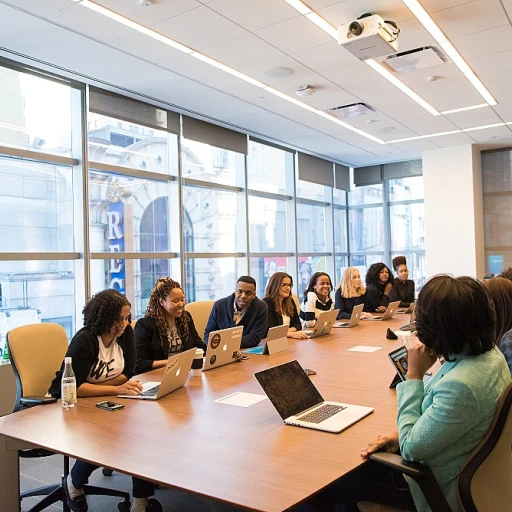
Understanding Emotional Intelligence in Leadership
Emotions Drive Leadership Success
In the dynamic landscape of leadership development, emotional intelligence has emerged as a cornerstone for successful leadership. It's not just about possessing technical skills or business acumen—effective leaders also need to cultivate an understanding of their own emotions and those of others. This understanding is especially crucial when leading diverse teams in projects, from entrepreneurship ventures to expansive democracy projects within local communities.
The Enterprise Development Institute (EDII) in Ahmedabad, India, has been at the forefront of fostering emotional intelligence among its students and youth programs. By integrating emotional intelligence training as part of their strategic partnerships, EDII helps budding leaders not only excel in entrepreneurship but also significantly contribute to economic development at local, national, and even international levels.
This educational focus on emotional intelligence aids leaders in navigating complex business environments and strategically adapting to change, an aspect explored further in our exploration of adaptive leadership. By understanding and managing emotions, leaders can drive innovation and effectively motivate teams towards sustainable development goals within society enterprises.
Leadership programs that emphasize emotional intelligence provide a foundation for future resilience, enabling leaders to adapt to change and foster innovation. This approach is particularly beneficial for young people involved in learning experiences such as summer camps and local communities initiatives, helping them build a solid emotional foundation for future leadership roles.
Understanding the role of a chief revenue officer further illustrates the intersection of emotional intelligence with leadership responsibilities, enhancing leaders’ capacities to drive economic and organizational growth.
Adaptive Leadership: Navigating Change
Embracing Flexibility in the Face of Change
The realm of leadership demands adaptability, especially in the dynamic environment of modern businesses and enterprises. This inherent necessity is particularly emphasized at the Enterprise Development Institute (EDII) in Ahmedabad, India, where programs focus on equipping leaders with the skills necessary to navigate the volatile and ever-evolving landscape of entrepreneurship and economic development. Adopting adaptive leadership styles is crucial for steering organizations through periods of change and uncertainty. This approach not only supports strategic partnerships in local and national contexts but also fosters a culture of innovation and sustainable development. Through its comprehensive training programs and projects, EDII facilitates the development of such adaptive skills in young leaders, preparing them for the challenges presented by both local communities and the broader global market. For example, EDII's initiative to engage students in immersive learning experiences, such as summer camps and democracy projects, allows young people to practice and refine their adaptive strategies. This hands-on experience is pivotal in enhancing their ability to lead effectively within various societal enterprises and the European Solidarity Corps, ultimately contributing to both local and national economic development. Moreover, the institute's commitment to sustainable development through entrepreneurship training provides leaders with the tools needed to foster resilience in their business endeavors. These programs also underscore the importance of continuous leadership development as a means of achieving long-term success. Understanding how to effectively pivot in response to emerging challenges is a hallmark of successful leadership. At the heart of this capability lies a deep comprehension of adaptive leadership principles, cultivated through dedicated programs like those offered at EDII. For more insights into how leaders can explore career pathways that embrace flexibility and adaptability, consider reading about exploring career pathways with homebridge.Building Resilience in Leaders
Strengthening Fortitude in Today's Leaders
In the dynamic world of entrepreneurship and development, building resilience in leaders is paramount. As challenges rise in businesses and the economic landscape shifts, the ability to weather storms is critical. The Enterprise Development Institute (EDI) recognizes this need and integrates resilience-building into its comprehensive leadership training programs. The Building Blocks of Resilient Leadership Leaders who possess resilience can support and guide their teams through adversity, maintaining stability and focus. The EDI nurtures this quality through immersive programs that mirror real-world challenges faced by business entrepreneurship ventures and national economic initiatives.- Experiential Learning Opportunities: With a focus on learning experiences, students at the institute engage in projects that reflect actual business scenarios. These projects drive them to think critically, adapt to new challenges, and explore innovative solutions.
- Collaborative Environments: During EDI workshops and summer camps, participants are encouraged to collaborate, creating a supportive space for young people to learn from one another's perspectives. This approach aligns with initiatives like the European solidarity corps that emphasize teamwork in democracy projects.
- Strategic Partnerships: Leveraging strategic partnerships with local communities and national enterprises, EDI provides insights into sustainable development and economic growth. These partnerships also provide access to mentorship and support, enhancing the ability to develop a robust support network.
- Adaptive Methodologies: Skills to effortlessly navigate change and adapt leadership styles to different circumstances are prioritized, contributing to robust enterprise development and solid grounding in both local and national economic contexts.
- Resilience Award Programs: Celebrating achievements through national entrepreneurship development awards motivates students, fostering a sense of accomplishment and resilience against setbacks.
- Resilience Resource Allocation: Customized programs provide resource allocation training, emphasizing managing resources strategically under pressure within business and economic frameworks.
The Role of Mentorship in Leadership Growth
Cultivating Leadership through Mentorship
Mentorship plays a pivotal role in nurturing leadership skills at the Enterprise Development Institute (EDII), where the intersection of entrepreneurship and leadership development paves the way for future economic advancement. Recognizing the significance of mentorship, EDII has integrated strategic mentorship programs into its curriculum, aligning closely with local and national economic development goals. The mentorship approach at EDII not only encourages personal growth among young people but also emphasizes shaping business acumen. By focusing on a dynamic learning experience, mentees are equipped to tackle the challenges faced in both entrepreneurship and leadership landscapes. This empowerment fosters entrepreneurship development and prepares students to confidently embark on projects that can elevate local communities. Programs like the European Solidarity Corps are indicative of EDII's dedication to broader societal development. Through strategic partnerships, the institute creates avenues for students to participate in democracy projects and engage in summer camps, promoting solidarity and instilling values that contribute to sustainable development. Mentorship is not limited to the academic spectrum. The national and international networks provided by mentors contribute significantly to the mentees’ business entrepreneurship journey. By drawing from a wealth of experience, mentors can guide these young leaders in establishing their enterprise development initiatives, ultimately leading to beneficial transformations that reverberate through society. EDII's mentorship framework illustrates how important mentoring is for leadership growth. In collaboration with stakeholders in India and globally, EDII continues its commitment to producing competent leaders who excel in entrepreneurship and add substantial value to economic frameworks.Fostering Innovation Through Leadership
Encouraging Breakthrough Thinking in Leadership
Fostering innovation within leadership is not just about thinking outside the box; it’s about reshaping the box altogether. At the Enterprise Development Institute (EDII) in Ahmedabad, India, a central aim is to nurture leaders who can drive innovation through dynamic leadership approaches. By encouraging students and young people to develop their entrepreneurship skills, EDII is paving the way for a new generation of leaders in business and society. In today’s rapidly evolving economic landscape, the ability to foster innovation is crucial for sustainable development. The institute recognizes that innovation stems not only from the designation of roles but from cultivating an environment that promotes creative thinking and responsive action. Business and entrepreneurship training programs are strategically developed to stimulate forward-thinking ideas that can contribute to both local and national economic growth initiatives.- Programs. EDII offers diverse programs designed to inspire innovation, including youth and national award initiatives, summer camps, and democracy projects that provide youth with hands-on learning experiences in enterprise development and entrepreneurship.
- Strategic Partnerships. The institute collaborates with local communities and engages students in projects across india, promoting a culture of innovation and economic development. These partnerships have a dual impact: they bolster community resources while honing the skills of soon-to-be industry leaders.
- Education and Training. The emphasis on comprehensive business education and specialized training helps prepare individuals for real-world challenges, equipping them to make meaningful contributions to the local and global society.
Measuring the Impact of Leadership Development
Evaluating Leadership Development Efficacy
Understanding the true impact of leadership development programs like those offered at the Enterprise Development Institute (EDI) is essential for both aspiring leaders and organizations aiming to foster business entrepreneurship and sustainable development. The effectiveness of these initiatives can often be assessed through various metrics and indicators that reveal improvements in leadership skills and overall business outcomes. To measure the impact of leadership development, the following approaches can be considered:- Program Feedback: Collecting feedback from participants, such as students and young people involved in the development institute's educational programs, provides direct insights into the learning experience. This feedback is instrumental in understanding what aspects of the training resonate most with attendees and where improvements might be needed.
- Behavioral Changes: Observing changes in behavior and adaptability among leaders post-training is another key indicator. As participants navigate change and apply skills like emotional intelligence in leadership roles, their ability to influence projects and drive economic development in local communities grows.
- Performance Metrics: Organizations may track the performance of leaders who have undergone training, looking for increases in productivity, innovation, and entrepreneurship within their teams. The institute's programs can effectively prepare leaders to craft strategic partnerships and contribute to national and local economic development initiatives.
- Mentorship Success: Through mentorship programs, leaders gain valuable insights, creating a ripple effect that extends beyond immediate results. The role of mentors in leadership growth can significantly enhance the ongoing development of young people involved in entrepreneurship development.
- Award Recognition: National and international awards can serve as benchmarks for both participants and the edii itself, validating the program's success and credibility in fostering leadership qualities.













